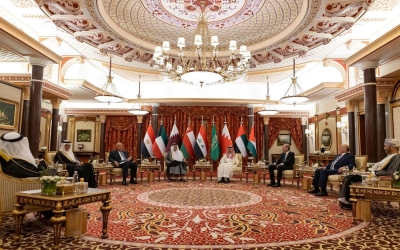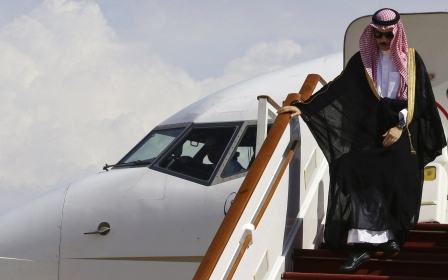Syrian 'gravedigger' pleads with US to pressure countries against Assad normalisation

An anonymous witness, described as a Syrian who witnessed and was forced to dig mass graves on orders from the Bashar al-Assad government, urged a congressional hearing on Tuesday to help pressure regional Arab countries from normalising with the Assad government.
In a hearing hosted by the House Foreign Affairs subcommittee on the Middle East, the Syrian witness called on the administration of US President Joe Biden to strengthen American sanctions on Assad.
"The Syrian people look to the United States to ensure that there are consequences for those who normalise with the criminal regime," said the witness, who attended the hearing virtually.
The witness told the room of US lawmakers that he was forced by Syrian authorities to be a gravedigger for the Assad government.
"I was not prepared for the horror of my new duties. Every week, twice a week, three trailer trucks are rock packed with 300 to 600 bodies of victims of torture and starvation and execution from military hospitals and intelligence branches around Damascus," he said.
New MEE newsletter: Jerusalem Dispatch
Sign up to get the latest insights and analysis on Israel-Palestine, alongside Turkey Unpacked and other MEE newsletters
“Twice a week we received three to four pickup trucks with 30 to 40 bodies, still warm, of civilians that had been executed in Sednaya prison. After seven years of bearing witness to these atrocities, I was able to escape Syria and follow my family to Europe.”
The congressional witness called on the US to pledge not to re-establish relations with Assad, and to strengthen the existing sanctions regime currently in place against Damascus.
"It is vital that the law is implemented to its fullest extent to hinder the region's chances of benefiting from things like the Arab gas pipeline. Under President Biden's administration, we have yet to see any real implementation of the Caesar Act," he said.
"Those who normalise the Assad regime are complicit and accomplices in Assad's war crimes."
The hearing comes as Syria has been on a diplomatic blitz in the wake of two deadly earthquakes. In addition to a steady drumbeat of visits to regional capitals by the country’s foreign minister, Assad has travelled to Oman and the UAE. However, Damascus appears to have received little tangible gains so far.
The US also eased some sanctions on Syria for 180 days for transactions related to earthquake relief efforts, but the country has not been able to tap its energy-rich neighbours and regional investors to begin funding reconstruction, which the UN estimates will cost around $250bn.

And while Saudi Arabia has been leading the most recent push at normalising ties with Syria - Assad met with Saudi Arabia's Foreign Minister Prince Faisal bin Farhan on Tuesday - a regional summit to discuss the prospects of re-establishing relations with Damascus last week ended inconclusively.
The US has repeatedly stated that it is opposed to normalising with the Assad government, but it recently has taken a softer approach to countries in the region working to re-establish ties with Damascus.
The congressional hearing comes several weeks after Barbara Leaf, the US assistant secretary for Near East affairs at the State Department, said that if Arab countries are to normalise with Assad, they should "get something" out of it.
"They want to try engagement," she said. "And our approach on that score is to say, then make sure that you get something for that engagement.
"I would put ending the Captagon trade right at the top, alongside the other issues ... that go to providing relief to the Syrian people from the terrible decade of oppression that they suffered."
The gravedigger described the comments by Leaf and the comments by the Biden administration as a "betrayal of the Syrian people".
Middle East Eye delivers independent and unrivalled coverage and analysis of the Middle East, North Africa and beyond. To learn more about republishing this content and the associated fees, please fill out this form. More about MEE can be found here.




